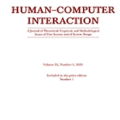As automated machine learning (AutoML) systems continue to progress in both sophistication and performance, it becomes important to understand the `how' and `why' of human-computer interaction (HCI) within these frameworks, both current and expected. Such a discussion is necessary for optimal system design, leveraging advanced data-processing capabilities to support decision-making involving humans, but it is also key to identifying the opportunities and risks presented by ever-increasing levels of machine autonomy. Within this context, we focus on the following questions: (i) How does HCI currently look like for state-of-the-art AutoML algorithms, especially during the stages of development, deployment, and maintenance? (ii) Do the expectations of HCI within AutoML frameworks vary for different types of users and stakeholders? (iii) How can HCI be managed so that AutoML solutions acquire human trust and broad acceptance? (iv) As AutoML systems become more autonomous and capable of learning from complex open-ended environments, will the fundamental nature of HCI evolve? To consider these questions, we project existing literature in HCI into the space of AutoML; this connection has, to date, largely been unexplored. In so doing, we review topics including user-interface design, human-bias mitigation, and trust in artificial intelligence (AI). Additionally, to rigorously gauge the future of HCI, we contemplate how AutoML may manifest in effectively open-ended environments. This discussion necessarily reviews projected developmental pathways for AutoML, such as the incorporation of reasoning, although the focus remains on how and why HCI may occur in such a framework rather than on any implementational details. Ultimately, this review serves to identify key research directions aimed at better facilitating the roles and modes of human interactions with both current and future AutoML systems.
翻译:随着自动化机器学习(Automal)系统在先进性和性能两方面继续取得进展,必须理解目前和预期的这些框架内的“如何”和“为什么”人-计算机互动(HCI),这种讨论对于最佳系统设计是必要的,利用先进的数据处理能力来支持涉及人类的决策,但对于查明日益增强的机器自主水平所带来的机会和风险也是至关重要的。在此背景下,我们侧重于以下问题:(一) HCI目前如何看待最新先进的Automal算法,特别是在开发、部署和维护阶段? (二) HCI在自动ML框架内对不同类型用户和利益攸关方的期望各不相同? (三) 如何管理HCI,使Aut-ML解决方案获得人类信任和广泛接受? (四) 随着自动MLU系统变得更加自主和能够从复杂的开放环境中学习,HCI的基本性质会如何演变?我们把HCI的现有文献投放到自动ML空间,特别是在开发、部署和维护阶段? (二) AutMLF框架内的HCI的预期性期望值是不同类型用户和利益攸关方的不同方向。 (这一联系,直到最终的用户间分析,最终的周期中,也就是分析,这种分析,直到最终的周期的周期,也就是的周期的周期中,这种分析可能如何进行。




